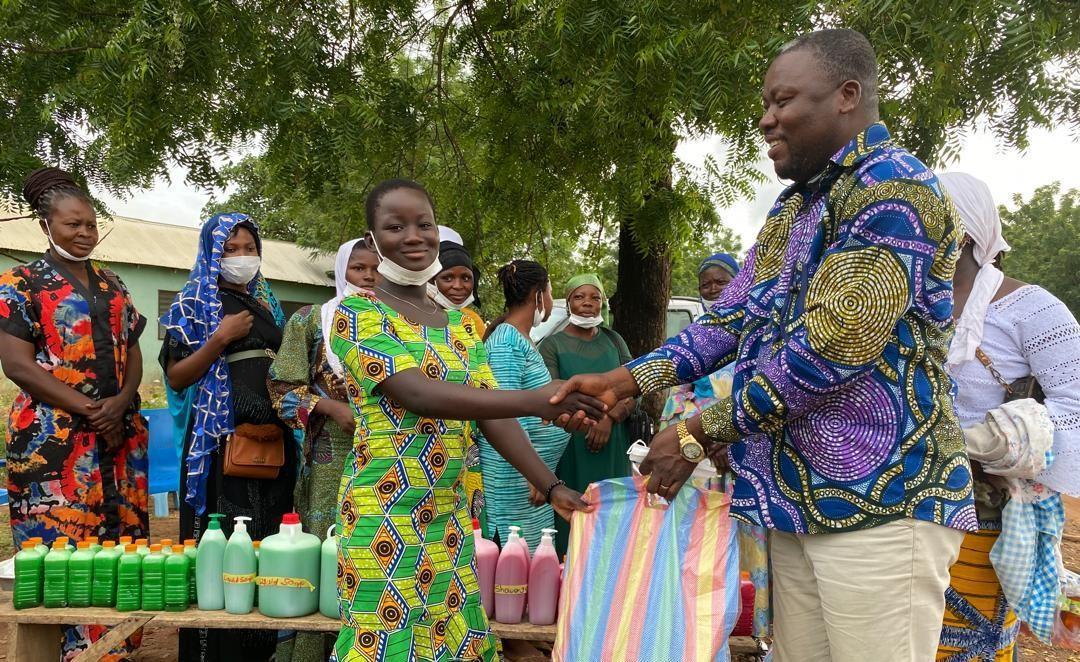Africa-Press – Ghana. The Meta Foundation, a Non-Governmental Organisation, has rolled out a livelihood empowerment project, to support 150 vulnerable individuals and 12 groups in three border communities in the Bawku West District.
The project, targeting women, youth, persons with disabilities, asylum seekers, refugees, and Fulbe pastoralists, who are often affected by conflict, displacement, and socioeconomic exclusion, is being implemented across the Tarikom, Sapeliga, and Widnaba communities.
The initiative, which has provided start-up support for vulnerable individuals in goat rearing, vegetable production, and vocational skills training for groups, seeks to tackle socio-economic exclusion, strengthen peacebuilding, and enhance local resilience.
The intervention is part of the “Improving Economic Resilience of Host Communities for Peacebuilding in Northern Ghana” project, funded by the Government of the United States of America, through the International Organisation for Migration (IOM) and the United Nations Development Programme (UNDP).
It seeks to empower both asylum seekers and host communities in Bawku West to enhance social cohesion and reduce vulnerabilities to violent extremism and poverty.
Mr David Amozebga, the Head of Programmes and Partnerships at the Meta Foundation, explained that the project had directly supported 150 vulnerable individuals with goats to rear as part of the income-generating activities interventions.
Additionally, 12 women and youth-led micro-groups had been supported with vocational skills, including the production of Tom Brown, shea butter processing, liquid soap production, rice processing, and the weaving of traditional smocks, he said.
Mr Amozebga mentioned other interventions under the project as mobile phone repairs, tailoring support with sewing machines, and livestock rearing through the distribution of goats and pigs.
In addition, Fulbe women engaged in milk production received basic processing and storage equipment to improve hygiene standards, boost productivity, and promote their integration into host communities.
“To address water and farming challenges, the project has provided solar-powered boreholes, water pumping machines, and improved vegetable seeds to these women and youth groups.
“These interventions are expected to enhance food security, reduce competition over limited resources, and strengthen social cohesion,” Mr Amozebga stated.
He stated that beyond livelihoods, the Meta Foundation had also organised capacity-building sessions on business development and financial literacy for all 150 beneficiaries, alongside community trade fairs to expand market access and foster cross-border trade with neighbouring Burkina Faso.
He indicated that the project was implemented in collaboration with key stakeholders and had engaged community leaders, local authorities such as the District Assembly, and security agencies to ensure sustainability, peace, and resilience in the border communities.
Mr Amozebga urged the beneficiaries to make good use of the support to improve their lives and that of their families.
Ms Vanessa Ndago, a beneficiary of the liquid soap training aspect, thanked Meta Foundation and its partners for the intervention, adding that the support had empowered her with income-generating opportunities to support her family.
Ms Abeneme Nposiba, another beneficiary, said the training and start-up support would provide income for her family to meet their basic needs including food and payment of school fees.
For More News And Analysis About Ghana Follow Africa-Press







